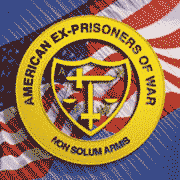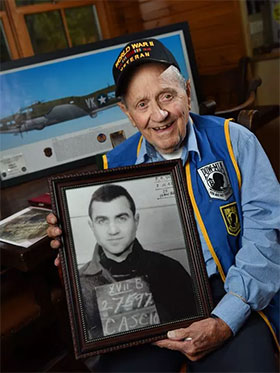
Established April 14, 1942
 |
American Ex-Prisoners of War
A not-for-profit, Congressionally-chartered veterans’ service organization advocating for former prisoners of war and their families.
Established April 14, 1942 |


Philip Cascio, then and now
|
||
| Last Name | First Name, Middle Init. | Nickname |
| Spouse | City | State, Zip |
| Conflict — Theatre | Branch of Service | Unit: |
| Military Job | Date Captured | Where Captured |
| Age at Capture | Time Interned | Camps |
| Date Liberated | Medals Received | |
| After the War ... | ||
Awaken at 4 a.m. Our B-17 Bomber was loaded for a bombing mission. We crossed the English Channel over France to Saint Nazzaire submarine pens. After a successful bomb drop, we began our long journey back to our base, Molesworth, England.
The flak approaching the target was just as bad leaving the target. Our next problem on our return to England was the many specks in the distant sky. German fighters were waiting to pounce on our formation. German fighters usually did not attack in flak areas. During those days German fighters were the best. Making matters worse, we had no fighter escort. The experienced fighters attacking our formation knew all the tricks. Imagine, our loss with no experience, facing an enemy who had made combat their profession -- this is the part of life that develops youth into manhood or you no longer exist. After a continuous attack by the German fighters we then entered another phase.
On our attempted return to our base, approaching the northwest coast of France, the sight of the English Channel boosted our moral. Still with distance to go and being attacked by many German fighters seemed to me there was no end to this mission. The excitement and surprises can never be described. For each attack by the enemy fighters, there will remain the pinging sound of bullets entering and exiting our bomber fuselage. Still being attacked and losing altitude with two engines gone, we could only expect the worst. Only a few feet above the water and now the third engine on fire, we were braced for the crash.
On impact the bomber broke into two parts: the tail section going down first with three crewmembers. The front section was still afloat. We three survivors exited through the radio room hatch. I was the last of the three survivors to escape. As I exited I jumped on the right bomber wing, and then I jumped into the inflated rubber dinghy. Who pulled the lever to inflate the two dinghies I will never know. The dinghy on the right side was inflated; the dinghy on the left side did not inflate due to damage by flak and bullets. We three survivors were able to get into the inflated dingy. The back tail section of the bomber sank first, followed by the front section. To add to the tragedy, we were then strafed twice by the German fighter.
We crashed in the English Channel at approximately 12 o'clock. We survived the flak, the German fighters, the crash, the strafing, and the overturns of the dinghy, the high waves and ice-cold water for 14 long miserable hours. We finally drifted to the French coast near Brest, France. In our long ordeal we had no rescue effort or help from either side. Both the Germans and Americans abandoned us.
Before drifting to the French coast we were overturned in the dinghy many times. We had tied cords to our wrists -- don't remember how cords were found -- probably dingy survival kit. Each time we flipped over we managed to help pull ourselves back into the dinghy. Waves were so high that at one time I felt that I saw the top of a ship mast. Cold and very cold was the menu of the day. We managed to stay alive by slapping each other on the face. You dare not go to sleep.
After drifting to the French Coast we managed to crawl to a small, abandoned shack. When you are wet and cold and in a cramped position for 14 hours you do not walk -- you crawl. In the shack we covered our bodies with leaves, paper and other trash to keep warm while we slept. Yes, we were more than exhausted.
At approximately 6 a.m., cold and dark, we could see in the distance a light in a small French house. We walked to the house and were given warm tea and bread by the frightened old French couple. We were also given dry clothes in exchange for our flight suits. We asked if we could sleep in the back room. We were refused because they were afraid of German soldiers in the nearby post. We left seeking help and hoping to make underground connections. At approximately 9 a.m. German soldiers captured us. Our next long tour of duty was as prisoners of war for the next 28 months in an arrogant enemy country, one determined to control the world as a Super Power and as a Super Race. I hope our present leader will never attempt to do the same -- yes, they have now made us believe we are the Modern Day Super Power! How long will this last!